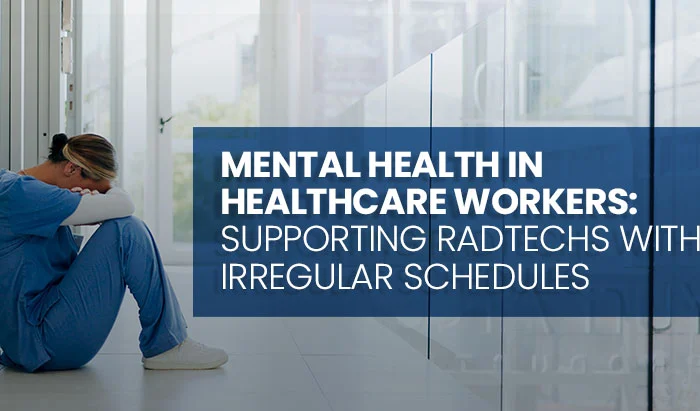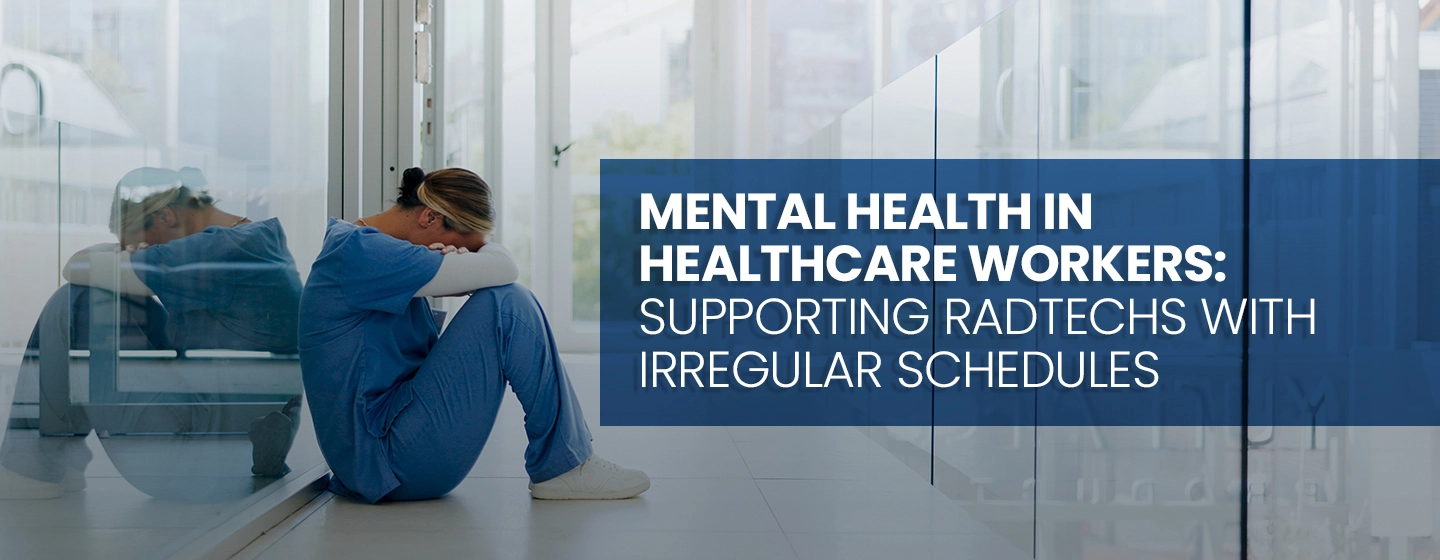Mental Health in Healthcare Workers

Mental Health in Healthcare Workers: Supporting Radiologic Technologists with Irregular Schedules


Introduction
Mental health is vital to overall well-being, particularly for radiologic technologists in the United States who face unique job-related stressors. A forthcoming study in the January 2023 issue of Radiologic Technology, the journal of the American Society of Radiologic Technologists (ASRT®), explores the potential relationship between the mental health of radiologic technologists and their work schedules. The study delves into how shift work, weekend shifts, and being on call may contribute to depression and anxiety among these professionals. Understanding these dynamics is essential for creating supportive work environments that promote mental health in healthcare workers.

The Toll of Irregular Hours on Mental Health in Healthcare Workers
The study highlights that shift work and irregular hours, common in the radiologic technology field, are significant stressors that can exacerbate mental health issues in healthcare workers. Radiologic technologists often work outside the typical 9-to-5 schedule, which can disrupt their circadian rhythms and lead to sleep disturbances, a known risk factor for both depression and anxiety. Weekend shifts and on-call duties further complicate their schedules, leading to increased stress and reduced opportunities for rest and recovery. This demanding work environment requires technologists to be constantly vigilant, as errors can have serious implications for patient care, adding another layer of stress. This issue is also a topic for debate regarding mental health in healthcare workers in other healthcare fields.

Coping Strategies and the Need for Systemic Support
To cope with the mental health challenges associated with their work, radiologic technologists employ various strategies aimed at supporting mental health in healthcare workers. The study found that some technologists turn to physical activities, such as exercise and yoga, to manage their stress and anxiety levels, which are common in healthcare workers. Others rely on social support from colleagues, family, and friends to navigate the emotional toll of their work. Mindfulness and relaxation techniques, such as meditation and deep-breathing exercises, are common coping mechanisms healthcare workers utilize. These strategies are vital for maintaining mental health in healthcare workers, but the study suggests that more systemic support from healthcare institutions is needed.

Institutional Strategies to Enhance Support for Mental Health in Healthcare Workers
In response to these findings, healthcare organizations can take several steps to support the mental health of radiologic technologists and other mental health healthcare workers. Implementing policies that promote work-life balance, such as more predictable scheduling and limiting on-call hours, can help mitigate some of the stress associated with irregular work patterns. Providing access to mental health resources, including counseling and stress management programs, can also benefit mental health in healthcare workers. By prioritizing the mental health of radiologic technologists and other healthcare workers, healthcare institutions can enhance job satisfaction, reduce burnout, and ultimately, improve patient care quality.

Conclusion
Mental health in healthcare workers and radiologic technologists is a critical concern that warrants attention and action. This concern should underline the significant impact of shift work, weekend duties, and on-call responsibilities on these professionals’ mental well-being. Recognizing the intricate relationship between irregular work schedules and increased stress, anxiety, and depression is essential for developing effective interventions. While individual coping strategies such as exercise, social support, and mindfulness play a crucial role, the study emphasizes the need for systemic changes within healthcare institutions. By implementing policies that promote work-life balance and providing robust mental health resources, healthcare organizations can create a healthier, more supportive work environment for radiologic technologists. This approach not only enhances rad techs’ well-being, but also contributes to higher job satisfaction and better patient care outcomes.
Disclaimer: The information provided on this website is intended to provide useful information to radiologic technologists. This information should not replace information provided by state, federal, or professional regulatory and authoritative bodies in the radiological technology industry. While Medical Professionals strives to always provide up-to-date and accurate information, laws, regulations, statutes, rules, and requirements may vary from one state to another and may change. Use of this information is entirely voluntary, and users should always refer to official regulatory bodies before acting on information. Users assume the entire risk as to the results of using the information provided, and in no event shall Medical Professionals be held liable for any direct, consequential, incidental or indirect damages suffered in the course of using the information provided. Medical Professionals hereby disclaims any responsibility for the consequences of any action(s) taken by any user as a result of using the information provided. Users hereby agree not to take action against, or seek to hold, or hold liable, Medical Professionals for the user’s use of the information provided.
